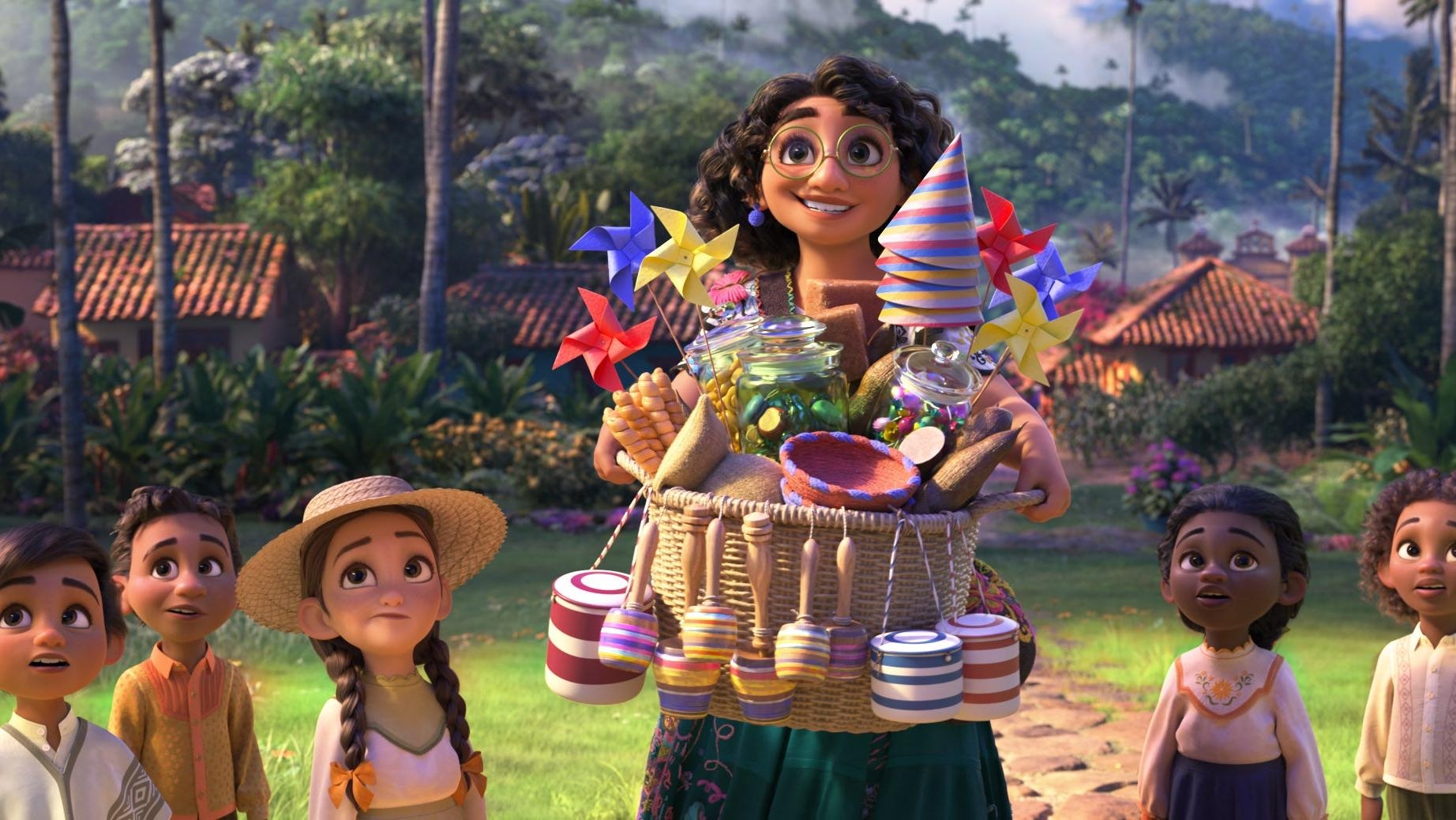Encanto upends Disney tradition with an adventure that never leaves home
Walt Disney Animation Studios’ 60th feature is a visual feast with a family focus


From Snow White And The Seven Dwarfs to Raya And The Last Dragon, Walt Disney Animation Studios has spent the past eight decades perfecting its signature riff on the classic hero’s journey. So it’s a bold move that for its 60th feature, Encanto, the studio turns so many of those classic tropes on their head.
Where most Disney animated protagonists are lucky if they get at least one living parent, Encanto’s plucky leading lady, Mirabel Madrigal (Stephanie Beatriz), lives in a house bustling with extended relatives. (How fun to see a Disney heroine with cousins!) And far from being special, she’s actually the one ordinary member of a family defined by their magical abilities. That makes Mirabel a sort of reverse Elsa, if you will, and instead of setting off on an adventure to find herself, her quest leads inward into her own family history and the secrets buried inside it. Therein lies Encanto’s biggest innovation: It’s a Disney adventure that never leaves the house.
To be fair, this is no ordinary abode. The film’s casita sits at the heart of an “encanto,” a magical town tucked away in the mountains of Colombia. The enchanted house has its own quirky personality, like the carpet from Aladdin. It can also conjure up massive, magical new rooms every time a family member comes of age and gains their power. (“It’s bigger on the inside,” one visitor gasps like they’re stepping into Doctor Who’s TARDIS, as they enter a cavernous jungle room ready-made for action sequences.)
Drawing from the Latin American tradition of magical realism, Encanto weaves its vision of magic into everyday life. The casita’s floorboards jostle to help Mirabel slip into her shoes as her glamorous older sister, Isabela (Diane Guerrero), sprouts flowers wherever she walks, Meanwhile, her mother, Julieta (Angie Cepeda), cooks food that can heal any ailment. From shape-shifting and super hearing to the ability to control the weather and talk to animals, the Madrigal family use their special gifts to keep the encanto running smoothly under the watchful, demanding eye of family matriarch Abuela Alma (María Cecilia Botero).
As ever, Disney succeeds at enveloping its audience in a lushly realized world that presents inventive visuals in a comfortingly classical animation style. While directors Byron Howard and Jared Bush previously made Zootopia together, it’s Howard’s work on Tangled that feels most influential here. The multigenerational, multiracial Madrigals offer a diverse representation of the Colombian experience, with each skin tone and hair texture represented as lovingly as Rapunzel’s locks were in that 2010 princess film. Encanto also borrows Tangled’s use of warm, glowing light as a major motif. The Madrigal family’s powers come from an enchanted candle that appeared to them in a time of strife. They refer to it as their “miracle,” and that religious reverie could also apply to the gorgeously twinkling imagery on screen too.
Storywise, the film’s family theme is also a welcome departure from the overly complicated, mythology-heavy worldbuilding of recent Disney animated films like Raya and Frozen II. Despite their #blessed attitude, all isn’t right in the Madrigal household. It’s Mirabel who first starts to see the cracks (literally) emerge in the picture-perfect façade her family puts forth as leaders in their community. And her investigation into their faltering magic leads her to discover that those closest to her are struggling far more than she realized. “I’m worthless if I can’t be of service,” Maribel’s super-strong older sister Luisa (Jessica Darrow) sings while literally carrying the weight of the world on her shoulders. Encanto delivers a poignant message about not focusing so much on our own burdens that we miss the fact that others around us have them too.
Yet like Disney’s other big November release, Eternals, Encanto struggles to serve its massive ensemble effectively. With 12 or so featured players, there’s just not enough room to flesh out their relationships to Mirabel and to one another while still making time for the requisite action-adventure moments and Mirabel’s own emotional arc too. Some characters we barely get to know at all, while others have their big issue introduced and resolved in a single song. It doesn’t help that Lin-Manuel Miranda’s musical numbers lean towards a pop sound that’s fun and catchy but lacks the emotional punch of Disney’s usual Broadway stylings. For all its compelling individual elements, Encanto doesn’t quite manage to weave them together into something greater than the sum of its parts—which is especially frustrating given that the idea of communal support is a driving ethos of the film.
Still, that unevenness gives way to great moments. The film’s standout sequence is a flashback montage set to Miranda’s elegiac Spanish-language song, “Dos Oruguitas.” There, Encanto re-anchors itself as a movie about intergenerational trauma—the way that the necessary survival methods of one generation can become the unhealthy coping mechanisms of another. It’s weighty but gently handled material in a thematically dense film that will likely reward multiple viewings. (Good news for parents.) While Encanto doesn’t break the Disney mold, it does give it an enchanting new shape. And it offers a timeless reminder to viewers of all ages: A problem shared is a problem halved, whether you’re leaning on your loved ones or the sturdy walls of an enchanted house.